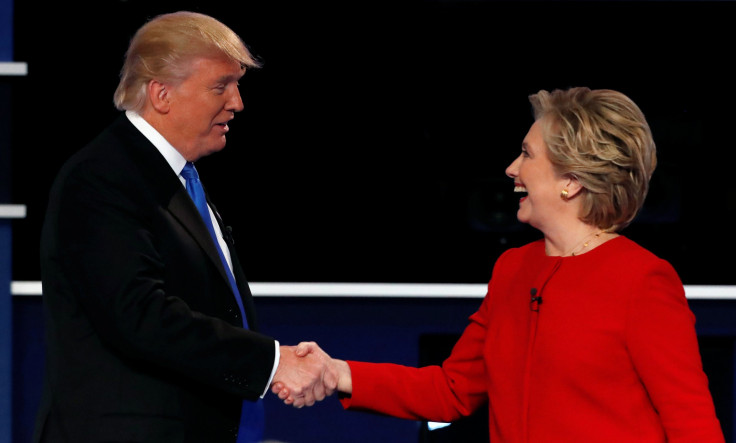Hillary Clinton, Donald Trump Latest Swing States Polls: Florida, Ohio, Pennsylvania, Nevada Still Up For Grabs?

The Trump train isn't off the tracks — but it's wobbling. Republican nominee Donald Trump has ceded ground to his Democratic opponent, Hillary Clinton, in both state and national polls ahead of Sunday's second presidential debate.
This might be because of a strong first debate performance from Clinton, who convincingly won the event in the eyes of most Americans, polls found. Nate Silver, editor of the data-driven, election-forecasting website FiveThirtyEight, posted to Twitter that recent state polls "are starting to look like early August or June," when Clinton had a "BIG lead nationally."
State polls we've gotten over the past 3 days are starting to look like early August or June, i.e. when Clinton had a BIG lead nationally.
— Nate Silver (@NateSilver538) October 6, 2016
As it stands early Thursday morning, Clinton holds a solid, but not insurmountable, 3.2 percentage point lead nationally in a four-way race, according to the Real Clear Politics average of polls. A survey from Economist/YouGov conducted during the first three days of October gave her a 3-point edge, 43 percent to 40. The most recent survey from Rasmussen Reports, which has reliably found more support for Trump than other polls, had the GOP nominee up 2 percentage points.
The Clinton camp has recently gotten some especially good news on the state level. After previously trailing Trump in the Sunshine State, FiveThirtyEight's polls-only election forecast now gives her a 63.5 percent chance of winning Florida. The state with 29 electoral votes is almost certainly a must-win for Trump. A late September poll from Mason-Dixon had Clinton up four percentage points. A poll from a local Fox station had it tighter, with Clinton up by 1 point, while the Real Clear Politics average for a three-way race in Florida shows the Democratic nominee up by 2 points. This is a noticeable shift from pre-debate polling. A Suffolk University poll just before the debate had Trump up by 1 point in the state and he led by as much as 4 points in early September surveys.
Pennsylvania, meanwhile, seems like it might be out of reach for Trump, according to recent polling. Post-debate surveys have shown Clinton up by as much as nine or 10 points, with the Real Clear Politics average giving her a 6-point edge in a four-way matchup. In mid-September, before the first debate, Clinton's edge was down to about 1-3 percentage points, according to a streak of polls. FiveThirtyEight's forecast now gives Clinton an about 80 percent chance of taking the state.
Pennsylvania's neighbor to the west is where things get really interesting — the race is tightening in Ohio. Trump previously led in the state heading into the first debate, according to most polls. Now, not so much. A Monmouth University survey released Wednesday had Clinton up by a slim two points. A post-debate Quinnipiac poll, however, had Trump up five points, while the Real Clear Politics average of polls put Trump up 2.4 points. Before the debate, FiveThirtyEight had Ohio leaning toward Trump and a pair of polls from Fox News and Bloomberg in mid-September had Trump up by five points. FiveThirtyEight now effectively has Ohio as a toss-up at the moment, with a slight lean to the left.
Nevada looks like it's effectively a coin-flip-state, as well. The Real Clear Politics average has Clinton up 1.4 points after a few post-debate surveys showed Clinton ahead by a small margin, while an Emerson College survey released Thursday pegged the race as a tie. Before the debate Trump was up about 1-3 points, according to a streak of polls. FiveThirtyEight is perhaps a bit more bullish on Clinton's odds in Nevada, giving her a 63.4 percent chance of winning the state Thursday.
© Copyright IBTimes 2025. All rights reserved.






















